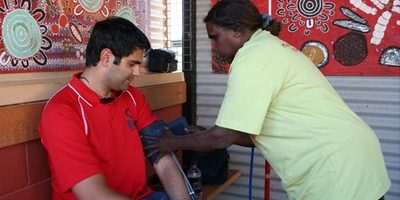
Kanyini Guidelines Adherence with the Polypill Study (Kanyini GAP)
Cardiovascular disease is the leading cause of death and disability for both Aboriginal and non-Aboriginal Australians alike. People with previous heart attack, stroke or other vascular diseases are among those at highest risk of having a future cardiovascular event.
Despite the availability of a number of simple, safe and effective drugs that reduce this risk, a substantial number of patients do not receive ‘indicated’ treatments, and particularly, appropriate combinations of these drugs that would maximise their beneficial effects. This may be due to the complexity, inconvenience and costs associated with doctors prescribing, and patients then taking, multiple drugs.
A ‘polypill’ may help improve this scenario by offering patients a simpler drug regime in the form of a single pill containing fixed-dose combinations of treatments.
Aims
The Kanyini GAP Study aims to assess whether patients prescribed a polypill-based drug regime have improved adherence and clinical outcomes compared with those given usual cardiovascular medications. The polypill used in the trial contains low dose aspirin, a cholesterol lowering drug and two blood pressure lowering drugs.
The study also aims to measure the prescription of combination therapy, barriers to adherence, quality of life, safety, cardiovascular events, prescriber acceptability and healthcare resource consumption to help build a complete picture with which to evaluate the polypill.
Methods
The study is a prospective, open, randomised controlled clinical trial of a polypill-based strategy compared to usual care among approximately 1000 individuals at high risk of cardiovascular events, augmented by a cost-effectiveness analysis and a formal process evaluation. The study will be conducted within Aboriginal Community Controlled Health Services and general medical practices in Australia, where participants will be followed up for an average of 18 months.
Guidelines Adherence with the Polypill
This collaboration has been formed between The George Institute, the Department of General Practice, Western Clinical School, University of Sydney and Monash University. These three groups have developed a research collaboration comprising of a diverse network of general practices in NSW and Victoria.













